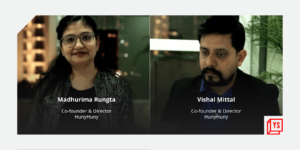“The corporate nine-to-five grind wasn’t for either of us,” says Shrehith Karkera, who along his Indian Institutes of Management (IIM), Ahmedabad, batchmates Bhanu Harish Gurram and Pawan Kumar Rai, had decided to opt out of campus placements. The bug of entrepreneurship had bitten all three.
For any business to succeed, it must address a need. One of the things startups must always do if they are to work is—solve a problem. The trio had discovered their problem statement early on as they scanned through financial reports, market documents and analytics during their time at IIM.
“How would a layman understand all this if they are to, say, enter the stock market or buy insurance or do anything related to their engagement with the financial market or personal finance?”
The founders’ aim to “simplify financial information” for the audience led to the inception of their two ventures, Finshots, a financial newsletter media company, and Ditto Insurance. Two very different startups in two contrasting sectors but with a common aim at the core.
The second venture Ditto Insurance was a “natural extension” of Finshots, with the ‘content community commerce model’ at play. The founders managed to build a large community of readers through their content business first and eventually built an insurance advisory and commerce platform on top of it.
Started in 2019, Finshots has gained a solid footing in the market while the relatively new venture, Ditto, is starting out on firm ground. The entry of Zerodha as an investor-cum-mentor holds significance here, as it helped the founders gain a clearer perspective of their business models.
Making financial information ‘simple’
“We started with simplifying the stock market for millennials. Pawan was already working on a similar project and we eventually joined him to explore our synergies together. The idea was to bridge the knowledge gap for people who are excited about stocks but aren’t intimately familiar with the nuances. We decided to solve this through robust content that can help people understand the complexities better,” says Shrehith as he talks about the incorporation of Finception (the brand name) or Finshots (the name of the popular 3-minute newsletter) in 2018.
Six months down the line, the founding trio was joined by Bhanu’s brother, Lokesh Gurram, as the fourth co-founder.
For the first 12 months, the startup focussed on publishing content around stocks. Initially restricted to one article per week, they managed to crunch a 30-40 pages worth highly technical subject matter copy or an elaborated balance sheet into a 12-minute read to help people get the gist of the company or a financial service/product.
“We never managed to scale up as we were able to push out just one story a week.” The year 2019, marked a turnaround phase for the startup with the entry of Zerodha.
Interestingly, one of the Finshots’s videos on the journey of Jet Airways’ business had caught the eye of Zerodha Founder and CEO, Nithin Kamath, who invited the co-founders for a chat.
“They (Zerodha) liked our content and we were asked to talk to Nithin. We were obviously more than thrilled to have that conversation. He believed that much more can be done with our humble idea,” says Shrehith.
Zerodha invested about Rs 4 crore in a seed round. Following its entry, the team started putting together a contour of how Finshots would look like and grow. The content, enlarged into everyday financial news, explains interesting business models of companies, their business journeys, acquisition stories besides other financial developments around the globe. Some of the interesting reads include — Why did Amazon buy MGM studios, Zomato and the unit economics problem, What does LIC do with its money, Citibank’s $900 million blunder and so on.
With zero marketing spend, Finshots has about 5,00,000 subscribers and has published over 400 reads.
Content to commerce, media to insurance: Unlocking the possibilities
Content was not the ultimate offering for the founders but rather the core around which different business models could evolve. The end goal, however, remains the same — simplifying finance for masses. Besides, the startup was yet to channelise its monetisation streams.
However, starting out with ‘content’ definitely helped them test the waters and get a better understanding of what resonates with the masses and the next big step was plugging in commerce.
In one of his blogs, Nithin Kamath writes, “I can’t think of the number of people that have approached us asking for help on the investing front. The only thing we could do to help was to suggest a few mutual funds, understand their needs and priorities, and help get their finances in order. We even ran an AMA (Ask me Anything) asking our subscribers to write to us if they had questions on personal finance. And out of the 2000 odd people that saw the post, a whopping 600 people wrote back to us asking for help. And that’s when we figured we had to do something about this.”
Following eight months of research, Ditto Insurance was officially launched in February 2021.
The founders correlate their journey with Hollywood actress Gwyneth Paltrow’s venture Goop, which started out as a weekly email newsletter providing new age advice and eventually expanded into e-commerce, launched pop-ups, podcasts, print magazine, wellness, cosmetics and so on.
“We wanted to see if we could do something in the financial domain, similar to what Paltrow did in fashion and lifestyle and how she went on to build an empire from a simple newsletter. This was meant to be a long term play where first we build an active community to whom we educate on financial news, make sure the content pipeline is sorted and then build on top of that by helping them make better financial decisions through our financial products,” says Bhanu.
Why insurance? Out of all the financial products, insurance is the most complicated one. Hence, our motto of simplification would bode well with the insurance business, he adds.
What exactly does Ditto do?
At present, the insurance market is crowded with fintech players in the industry selling insurance. Ditto clearly doesn’t put itself in that category.
We are a premium advisory service, explains Bhanu. If someone is looking to buy health or term insurance, Ditto’s suite of 30 trained advisors will effectively handhold them through the entire process.
They understand the needs and priorities of the buyers and recommend 2-3 policies that suit individual needs for consideration, make sure they understand what they are getting into, simplify the technicalities stated in the policy documents and overall what the product actually offers, in the most simple manner. They help in the purchase process like filling up forms, making disclosures along with post purchase services in case the buyer needs to make a claim.
The startup makes money (commission) in case the buyer decides to purchase the insurance via the platform. On the distribution side, though Ditto does exactly what other platforms such as PolicyBazaar do, its core offering and focus remains advisory, which is free of cost.
In such a case scenario, it is important for the platform to optimise for conversions and make sure its lead funnel is sorted since it handles limited calls/clients. Interestingly, 70 percent of the people who have bought insurance from Ditto have come via Finshots.
“Our major USP (unique selling point) is that we don’t spam people or make cold calls. We treat them with dignity and respect. You can buy directly from the insurance company or via Ditto. Again, no pressure! We are building something for the long term and do not push sub-optimal products for commissions,” says Bhanu.
Another major differentiator according to the founders is the experienced advisors in contrast with ‘agents’ who are mostly trained for about a week and have restricted engagement with customers through a script. “You ask them anything outside the script, they will be clueless.”
Not swayed by commissions
Being driven by commissions and cross-selling products do not quite fit with Ditto’s philosophies, the founders point out.
“It’s a short term play. We can sell a bad product on our platform but that would not take us too far. Eventually the customer would know that they were cheated. This doesn’t go with our motto. We put users first and recommend plans that are actually good for them and not products that are good for us.”
Ditto has grown its team from 10 to 70 in the past 11 months and hopes to become a company of over 250 people in the near future.
Though still at an early stage, the founders say the conversion numbers are fairly high at present. It has partnered with nine insurance companies. (health, general and term/life).
“We are looking to scale up our numbers and will definitely leverage Zerodha’s partnership. The focus right now is operational efficiencies and customer experience,” says Shrehith.
Going ahead, the founders would continue to explore the ‘content community commerce model’ across other financial products, once they manage to establish their proficiency in the insurance sector. That said, they do not intend to do anything outside insurance for the next 2-3 years and want to continue to focus on building Ditto while Finshots “runs on autopilot”.
According to India Brand Equity Foundation (IBEF), the future looks promising for the insurance industry with several changes in regulatory framework which will lead to further change in the way the industry conducts its business and engages with its customers. The online insurance market in India is expected to reach a value of approximately Rs 220 billion by 2024, as per advisory firm Mordor Intelligence.
The founders in one of their blog’s post say:
The most riveting part of this whole endeavour?
The fact that for the first time ever, a newsletter media company would evolve into a full-fledged insurance company.










